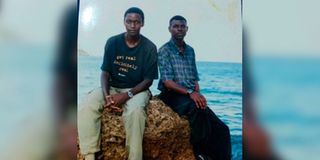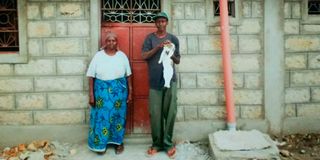
Paul Kamau Kitheka, a sign writer and an artist, went missing in 2010.
| PoolDN2
Premium
13 years on: Family's painful search for missing man
The pain of searching for a missing loved one can only be understood by someone who has gone through the journey.
It is what Mary Wambui describes as an open wound that is constantly bleeding. You never know when your wound will stop bleeding. What is worse? No one has a solution for that wound.
In April 2010, Paul Kamau Kitheka left their home in Kyumbi, Machakos. Everyone assumed that he had gone to work as usual and that he would come back in the evening. Thirteen years later, they are still waiting for his return.
Mary Wambui, Paul’s sister, and her daughter Agnes Wambui take us through the journey.
“Paul was born in 1969 in Machakos. He is the firstborn. We had a younger brother who passed on in 2007. Our mum used to work at the Kenya Meat Commission. Our parents took us to Kandara, Central Kenya, and from there Paul joined Gatundu Primary School. He later went to Paul Junior Seminary in Katoloni for his secondary school studies. He performed very well with Distinction One, which led him to Njiri School for Form Five and Six.
At Njiri School, he excelled and joined Kenyatta University to pursue a Bachelor’s degree in Education, Geography and History. He was artistically talented and while in KU, he changed courses to study art. He said teaching did not seem like a fulfilling career and to everyone’s surprise, he quit school while in second year.
This shift was sudden, especially to my parents who had very high hopes in him. Initially, he hustled with friends and lived around the neighbourhood near the school. After a while, in the late 90s, he went missing for the first time.”
Unknown to his family, this was the beginning of their encounters with searching for a missing person.
The first search
“Around 1998, someone told our mum that Paul had been spotted in Mombasa and I travelled there to look for him. I knew he was a sign writer so that narrowed my search to art shops. I travelled at night and got there in the morning. There were no phones and I did not even have his picture. I found a group of sign writers and I asked if they had seen him. I described his appearance. They directed me to a building called “Twins”. When I got to there, I found an Asian man who called my brother to come meet me. Paul was shocked to see me. He cried, we talked a lot, took some photos to preserve the memory but he did not come home with me. He said would come back by himself. I went home and told everyone he was fine.
However, Paul never home came and our younger brother, Isaac Kirega went to look for him afterward, in the early 2000s. He used the same method I used and found him. Paul was well known among the other sign writers because he was very talented.

Paul Kamau Kitheka (left) with his brother Isaac Kirega, in the early 2000s at the Kenyan Coast. Isaac had just found Paul after he disappeared first in the late 1990s.
After that visit, he started coming home more often. When our father passed on in 2002, Paul attended the burial then went back to his work.”
Although Paul would go quiet for long periods, there was always hope that he would either show up or they would find him. In 2007, when Isaac (his younger brother) passed on, Paul came home for the burial. He kept up these appearances and at some point, lived in the family home’s compound, right next to their late mother, Agnes Mueni’s home. This was until late 2010, when he left once more and was never seen again.
Listening to Paul’s story, one must wonder what triggered his need to go away. Was he mentally unwell, was there conflict or some sort of influence?
Mary says, Paul was healthy and he had no history of mental illness. He smoked and drank alcohol occasionally. However, his relationship with their mum was a bit strained after he quit school.
Fall out with mum
“In our last conversation, right before he went missing, he felt like he was not supported enough. When I talked to one of his friends, I was told Paul was quite bitter because he did not feel appreciated. The big fall-out stemmed from Paul’s decision to drop out of school.
Initially, Paul was very close with our parents especially because he excelled in school. They had high hopes in him. But when he dropped out, all these hopes came crashing. It was difficult for mum to see some of Paul’s classmates who had not performed as well as he did go on to secure good jobs while her son ‘struggled.’
Despite the fall-out, Mary says their mum still loved Paul and his absence hurt her.
Agnes Wambui, Mary’s daughter, started searching for her uncle shortly after his disappearance in 2010.
She had bonded with him after completing her high school and spent most of her free time with him for the better part of 2010.
At the time, Agnes was living with her grandmother. She still recalls that day when she saw Paul for the last time.
“Normally, he would wake up early. Sometimes he would bring me snacks since I was the only child at home. He liked cooking for himself and sometimes we would share a meal. That day, he left for work and never came back in the evening.

Agnes Wambui poses for a picture on June 27, 2023. She has been looking for her uncle who has been missing since 2010.
After he left in 2010, I joined college. He had a phone number which he was using before leaving. I tried calling him but the phone was always off. One time in 2013, the call went through and we talked. I was excited when he answered my call. I asked him why he never comes home. He said he was in Nairobi working and I also told him I was in Nairobi studying. I asked if we could meet and he agreed. He sounded interested in meeting because during the conversation, I told him I was about to finish college and start job hunting. He told me he would help me look for a job. We agreed on the day to meet but when I called that day, his phone was off. That was the last time I heard from him.”
In 2015, there was one another hopeful encounter. One of their family friends from their neighbourhood was attending her daughter’s wedding and she bumped into Paul in Mombasa. They talked briefly and Paul was doing well. However, she did not know that Paul had gone missing. Later in the year, when she learned about his disappearance during a random conversation with Paul’s mum, she narrated the encounter.
Unfortunately, she could not help them trace Paul to an exact location in Mombasa but kept reassuring them that he was well. The family has continued to search far and wide for their kin, to no avail.
Online scams
“I have been posting a lot on social media especially on Facebook. We have gone to Safaricom to see if his ID number has any new phone numbers registered with it but there was nothing. We've also tried to report to the police station in Kyumbi near where he lived because that is the last place we saw him. They explained that a missing person’s case is supposed to be handled by the police station near where a person lived before disappearing. They also told us that anyone who is over 18 years and is of sound mind is not treated the same way as a missing child. It is assumed they know what they are doing and they are probably missing on their own will.
They advised us to go to Mombasa and follow-up on the case from there since that is where he was last seen. They also advised us to consider searching for him in different prisons, though we are supposed to seek permission to access the prisons.” As they deploy these search efforts, they have not only been fruitless but quite challenging. Social media, for instance, opened the family up to scams. One time someone called pretending to know where Paul was. He convinced them that he was in Namanga and he had been seriously injured. But his story turned out to be a well-crafted scheme to fleece them. The caller claimed that Paul was admitted at a certain hospital but a quick search showed that there was no such hospital in Namanga. Luckily, Paul’s family was able to avoid the scam.

Paul Kamau Kitheka (right) with his late mother, Agnes Mueni at their home in Kyumbi in October, 2004.
“No one understands what it's like to look for a missing loved one, not even the police because this is not something that happens to many people. I've also tried to research on formal channels of searching for missing people and there are no systems in place to help find missing adults.”
Sadly, Paul’s mum passed on in 2022. Agnes says she held a firm hope of seeing her son again to her very last breath.
“When grandma was alive, she would sit outside her compound and just watch the entrance. She was always hopeful that he would come back one day. Even when she was really sick, we hoped that he would instinctively come back,” shares Agnes.
In 2022, just before their mum died, Mary felt compelled to go to look for Paul. They had gotten a tip from one of Paul’s old friends who said he was in Malindi. This was in April, and their mum’s health had deteriorated making the search more urgent than ever. However, when Mary prodded this friend further, he got shifty and that is when she decided to make the trip down to Malindi.
She was accompanied by her uncle and the search began with the usual lead: sign writers.
Another trip to Mombasa
“We tried our old method but we could not find him. We showed people his photo, but no one had seen him. When we couldn’t find him, I concluded that maybe he changed his career. We still shared our contacts with the people we met. We call often to check if he has been spotted somewhere. When our mum passed on we put her photo and a burial announcement in the newspaper, hoping that Paul would see it and come for the funeral but he did not show up,” says Mary.
“When the Shakahola story came out, for a moment I thought he ended up there even though I know he has always been a staunch Catholic who would never be convinced to join a cult. I’ve had many thoughts since he left. I have a wound in my heart and I think about him a lot. The fact that I don’t know whether he is alive and well, bothers me. I got to a point where I just pray that he will come back. But I have never wished harm on him. I am sad but not angry. My spirit tells me that Paul is alive, but I want to know how he is doing. If he ends up reading this, I would tell him, now, it’s just me and him, everyone else is gone. Let him forgive whoever hurt him, forget the past and come home. East or West, home will always be where the heart is at peace. He should also know that mum had nothing against him and she was always ready to welcome him home again.”




